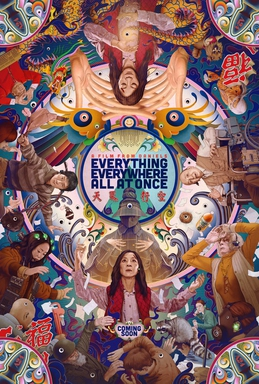
Just before I entered the cinema to watch this film, my friend told me this was meant to be the best film ever made. That’s quite a lot of information to digest about two seconds before watching a film you know hardly anything about. My expectations for this film went from low to high in those two seconds.
I tend to go into films knowing approximately nothing about them. For this film, all I knew was that it was a sci-fi film and that it was apparently the best film ever made. That is exactly the right amount of information to know going into this film! I reckon if you knew much more than this, the film would lose some of its affect. Ironically, to enjoy this film, it is best to know nothing nowhere in due course.
So if you haven’t watched this film, I would advise you to stop reading here so you can watch it. Watch it this exactly instant if you can. Literally, right now! I enjoyed this film so much that, immediately after leaving the cinema, I messaged just about everyone I knew to instruct them to watch it. And the day after, I spent all day at work animately waxing lyrics about its perfection. So, run (or parkour) your way to your local theatre and bask in the glory of Everything Everywhere All At Once.
‘I Was Just Looking For Someone Who Could See What I See, Feel What I Feel’ — Jobu Tupaki.
I think what surprised me the most about Everything Everywhere All At Once is that it is a film about appreciating others and allowing yourself to connect to them. At the beginning of the film, you would never guess that this film was going to be an emotional rollercoaster. The film starts by introducing the audience to the Wang family. This family are the epitome of the dysfunctional family – they couldn’t be less in sync if they tried. Evelyn is struggling to keep control of the family laundrette. Waymond is preparing for divorce. And Joy just wants her sexaulity to be recognised. The family is coming apart at the seems. In fact, they have completely unvarelled. They are three pieces of lose string.
The camera movement reflects this disconnection. When following Evelyn it matches her frantic pace. It relentlessly tilts and pans. The audience’s eyes are (just like Evelyn) unable to sit still. In contrast, the camera is much more static when Waymond and Joy are in the shot. The opening of the film is jarring to watch because the family are ajar.
The later sections of the film are jarring in another way. Once the characters enter the IRS building (to sort out the family’s finances), the plot never stops. It is a washing machine stuck on high spin speed. The viewer is introduced to Alpha Waymond (a superhero-esque version of Waymond from an alternative universe) who high kicks the plot into a face-paced action-adventure. Evelyn (and the audience) learn that she is the universe’s (or multiverse’s) only hope to prevent Jobu Tupaki from destroying it. Waymond requires Evelyn to versejump (tap into her alternative selves’ skills). To do this, you have to do something you rediculous. Something you would never normally do. This concept provides the film with the majority of its humour. It forces the characters to step out of their comfort zone and make the (I don’t think I’ll ever be in the cinema and hear as many audible groans as when two men insert phalic statues into thier annus).
This sounds conviluted, but somehow when watching the film everything makes as much sense as it needs to. It the audience is confused, it is on purpose. Everything from the everything-bagel, Raccacoonie, and the hot-dog finger universe somehow makes sense within the bazzarness of the film. This is the magic of Everything Everywhere All At Once. It might be a jigsaw puzzle with no guide picture, but you are somehow content with the knowledge that you are missing a piece.
At first, it seems like the biggest shock will be the revelation that Jobu Tupaki is none other than Evelyn and Waymond’s daughter Joy. Yet, just while you are adjusting to this unmasking (or un-hooding), you are propelled into even more uncharted teritority. This is the point where the film becomes insanely emotional.
You perhaps could have guessed that the film’s plot would, like all good theme park rides, include sharp turns and mindbending loops – after all, it is a sci-fi film that starts in a realistic setting. However, you just wouldn’t guess that these new dimensions and loops would be emotional. Yet, it is not just the plot that takes unexpected directions, it is also your emotions. Your emotions are thrust upon an unifamiliar path you watch this film. I’m not one to cry at films (the last film I cried at was Aladdin 2019 and gin very much influenced those tears), but even I found myself holding back the tears. I was about two seconds away from having an existential crisis, before luckily the film rose to new heights and elevated my mood.
The audience is told that the familiar version of Evelyn is the worst version of her. In this universe, she has essentially made all the wrong decisions. She could have been much more successful if she had zigged instead of zagged. Essentially, if she had not married Waymond, she could have been an action star with money, talent, and glory. This sounds incredibly depressing. And, at this point in the film, I started to become a nihilist. But, just when you are about to dig yourself a hole to lie down instead of fight, the film delivers a life affirming message through a simple plot twist.
By revealing that Jobu Tupaki is not trying to destroy the world, she is just trying to connect with her mother, the film suddenly becomes the feel-good movie of the decade. The film is about recognising and accepting your family for what it is. It forces you to remember that love your life and the people within it. For a black comedy, this message is anything but black. It is as bright as a sunny day. Like a summer’s morning, the film takes you out of your seasonal depression and elevates your mood. You leave the cinema with a new lease of life – I literally told everyone I know that I love them.
Everything Everywhere All at Once makes you feel every emotion everywhere all at once. I left the film feeling sad, happy, happy-sad, and sad-happy. My emotions (much like the plot of the film) defied linear logic but did not leave me feeling confused. I was emotional and content with this and my life.

